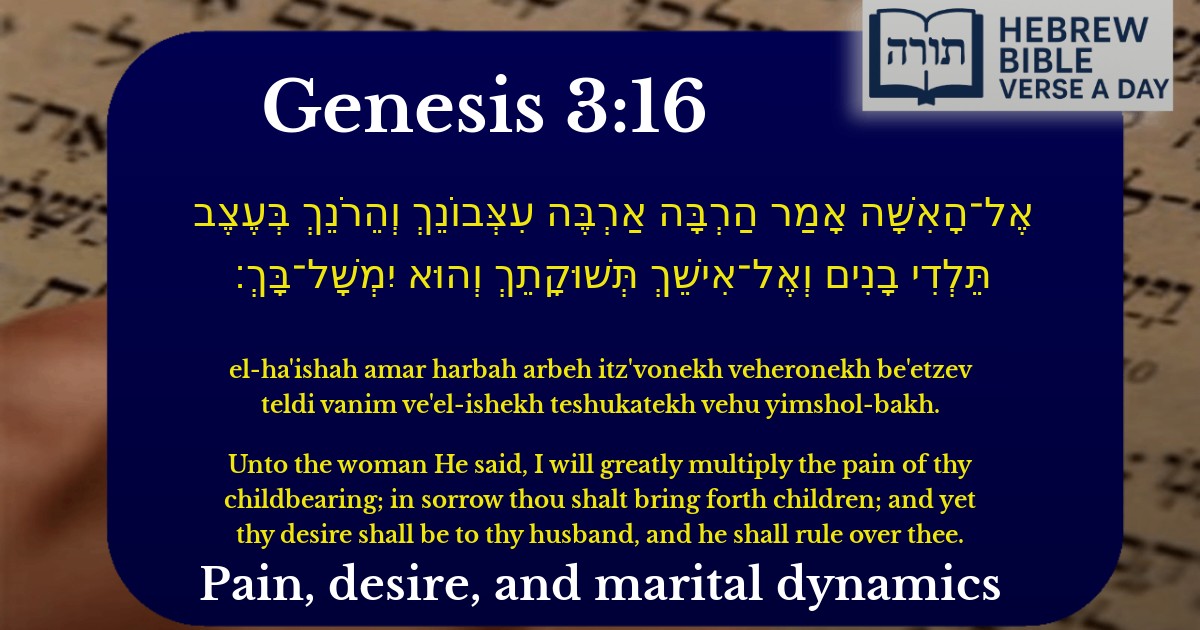Join Our Newsletter To Be Informed When New Videos Are Posted
Join the thousands of fellow Studends who rely on our videos to learn how to read the bible in Hebrew for free!
Hebrew Text
אֶל־הָאִשָּׁה אָמַר הַרְבָּה אַרְבֶּה עִצְּבוֹנֵךְ וְהֵרֹנֵךְ בְּעֶצֶב תֵּלְדִי בָנִים וְאֶל־אִישֵׁךְ תְּשׁוּקָתֵךְ וְהוּא יִמְשָׁל־בָּךְ׃
English Translation
Unto the woman He said, I will greatly multiply the pain of thy childbearing; in sorrow thou shalt bring forth children; and yet thy desire shall be to thy husband, and he shall rule over thee.
Transliteration
El-ha'ishah amar harbah arbeh itz'vonekh veheronekh be'etzev teldi vanim ve'el-ishekh teshukatekh vehu yimshol-bakh.
Hebrew Leining Text
אֶֽל־הָאִשָּׁ֣ה אָמַ֗ר הַרְבָּ֤ה אַרְבֶּה֙ עִצְּבוֹנֵ֣ךְ וְהֵֽרֹנֵ֔ךְ בְּעֶ֖צֶב תֵּֽלְדִ֣י בָנִ֑ים וְאֶל־אִישֵׁךְ֙ תְּשׁ֣וּקָתֵ֔ךְ וְה֖וּא יִמְשׇׁל־בָּֽךְ׃ <span class="mam-spi-samekh">{ס}</span>
אֶֽל־הָאִשָּׁ֣ה אָמַ֗ר הַרְבָּ֤ה אַרְבֶּה֙ עִצְּבוֹנֵ֣ךְ וְהֵֽרֹנֵ֔ךְ בְּעֶ֖צֶב תֵּֽלְדִ֣י בָנִ֑ים וְאֶל־אִישֵׁךְ֙ תְּשׁ֣וּקָתֵ֔ךְ וְה֖וּא יִמְשׇׁל־בָּֽךְ׃ {ס}
🎵 Listen to leining
Parasha Commentary
📚 Talmud Citations
This verse is quoted in the Talmud.
📖 Eruvin 100b
The verse is referenced in a discussion about the nature of marital relationships and the consequences of the sin in the Garden of Eden.
📖 Ketubot 61b
The verse is cited in the context of discussing the obligations and dynamics between husbands and wives, particularly regarding childbirth and marital authority.
📖 Niddah 31b
The verse is mentioned in a discussion about the pain of childbirth and its theological implications.


Punishment of Chava (Eve)
The verse describes the consequences given to Chava after the sin of eating from the Tree of Knowledge. Rashi explains that the phrase "הַרְבָּה אַרְבֶּה עִצְּבוֹנֵךְ" ("I will greatly multiply your pain") refers not only to the physical pain of childbirth but also to the emotional distress of raising children. The Midrash (Bereshit Rabbah 20:7) elaborates that this includes the sorrow of pregnancy, the pain of labor, and the challenges of child-rearing.
Childbirth in Sorrow
The phrase "בְּעֶצֶב תֵּלְדִי בָנִים" ("in sorrow you shall bring forth children") is interpreted by Ramban (Nachmanides) as an ongoing condition for women, contrasting with the ease of childbirth that would have existed had Adam and Chava not sinned. The Talmud (Eruvin 100b) notes that this sorrow extends beyond physical pain to include the anxiety and worry a mother experiences for her children throughout their lives.
Desire for Husband and His Rule
The latter part of the verse, "וְאֶל־אִישֵׁךְ תְּשׁוּקָתֵךְ וְהוּא יִמְשָׁל־בָּךְ" ("your desire shall be to your husband, and he shall rule over you"), is explained by Ibn Ezra as a natural inclination of a wife toward her husband, despite the pain associated with childbirth. Rashi adds that this "rule" is not arbitrary but reflects the structure of marital relationships, where the husband has certain responsibilities and authority in the household, as outlined in halachic marriage (Ketubot 61a).
Spiritual Lessons